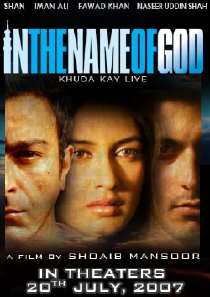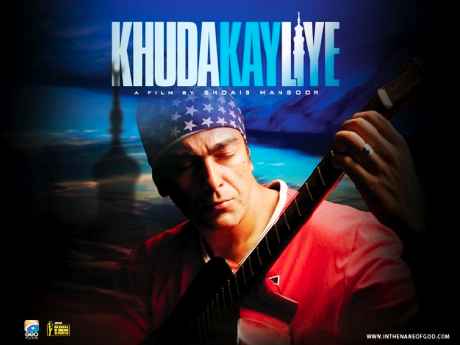(UPDATE: You can view this movie here).
We had a preview of the movie Khuda Ke Liye at ATP where we had posed a question whether Shoaib Mansoor will be able to revive Pakistan cinema? A probable answer comes from myself who recently got chance to see this movie. The record breaking Pakistani film Khuda Ke Liye has become my favorite film overnight- Hollywood inclusive. Or more accurately I should say, that there hasn’t been a film in the past that has moved and affected me in this way.
Given the standing ovation the film is getting in theatres all over Pakistan from rich and poor alike, one can safely say that I am not the only one. For one thing it is a uniquely Pakistani story, which could have only come out of Pakistan. To sum it up, it is about us – the people of Pakistan warts and all- take it or leave it.
The genius of Shoaib Mansoor was never in doubt for those who have seen his videos or for that matter the famous Alpha Bravo Charlie – the TV Drama on Pakistan Army. What I was unprepared for was the depth in his thought and the way he has managed to capture the Pakistani dilemma on screen. Ours is a complex and rich predicament which needs to be captured in all its nuances and appreciated in all its paradoxical colors. KKL did just that.
 I went to the theatre expecting to see the same old liberal v. fundo arguments. There were those, but unlike how these arguments play out in “The Friday Times” and the “Nawai Waqt“, this remarkable film is fully conscious of its Pakistani identity and the strong Islamic component that forms part thereof.
I went to the theatre expecting to see the same old liberal v. fundo arguments. There were those, but unlike how these arguments play out in “The Friday Times” and the “Nawai Waqt“, this remarkable film is fully conscious of its Pakistani identity and the strong Islamic component that forms part thereof.
At the risk of spoiling it for those who haven’t seen it, this is the story of two brothers, Mansoor (played by Shaan) and Sarmad (played by theatre actor/musician Fawad of EP fame) both musicians, brought in a well to do Pakistani family. Mansoor and Sarmad are torn apart by the latter’s increased involvement with a certain Maulana Taheri (based most probably on Maulana Sami ul Haq of JUI-S component of the MMA), who turns the soft spoken Sarmad into full fledge Jehadi.
Things are complicated when the brothers’ cousin Mary arrives from London to spend a few days with them, only to discover that she has been tricked by her father into coming to Pakistan to avoid her marrying her Non-Muslim boyfriend Dave. Meanwhile Mansoor leaves for Chicago to enrol at the “School of Music” there. In an epic that switches from London to Lahore to Waziristan to Nangahar Afghanistan to Chicago, these ordinary Pakistanis are increasingly faced with both internal and external conflict. And then there is September 11.
Shoaib Mansoor does not miss a beat, he does not leave any stones unturned. While all characters have more or less the same significance in this plot, it is Mansoor who is at the centre of it: Mansoor who is a proud Pakistani and secure in his Muslim identity, Mansoor who warns Sarmad against extremism, Mansoor who puts the best Muslim and Pakistani foot forward, Mansoor who is abducted by FBI in the middle of the night and beaten and tortured to a pulp, humiliated and abused for being a Pakistani and a Muslim. He is the contrast to Sher Shah and Maulana Taheri. But there are contrasts on the other side as well… Jenny who loves Mansoor for being Mansoor, his classmates who spontaneously join in when Mansoor performs his “music from Pakistan”, his African American professor… all stand in contrast to the American torturers of Mansoor.
The dialogue reaches a fever pitch in a court room in Lahore, where Mary is engaged in a prolonged legal battle. Enter the Bollywood star Naseeruddin Shah. He plays the character of a long bearded progressive Islamic scholar (probably based on Maulana Ahmed Javed and Allama Javed Ahmed Ghamidi of Lahore). In what would be the localised version of “Inherit the wind” Courtroom drama, he engages Maulana Taheri and his coterie in an argument on Islamic law and Islamic dress code.
“There is beard in religion, but no religion in beard,”
declares Shah, adding that
“Two men who did the greatest service to Islam in Pakistan, Mahomed Ali Jinnah and Allama Iqbal, did so without a beard and out of the so called Islamic dresscode, in western dress.”
It was on this line that the entire hall filled with applause. Islam – the universal faith – has no uniform. This lays the stage for the final scene- the most poignant scene of the movie, filmed in Lahore’s beautiful Wazir Khan Mosque– the scene which once again made a Muslim out of me. I’ll let you watch it yourself to understand what I am talking about.
As for the film itself, there seem to be a few technical glitches earlier on but they are easily forgotten. Iman Ali‘s performance as Mary or Maryam in the beginning is annoying and one finds her concocted British accent a little annoying at first. However it grows on you and one discovers the fullness of her effort- which is by far the best I have come across by a Pakistani actress. As for the music, those of you who have only heard Bandaya, you are in for a surprise. The film is as a whole an incredible musical experience. What is more is that you discover how aptly Shoaib Mansoor has placed his music in the various scenes. Indeed, driving back from Lahore on the motorway, I could recount/recollect every scene just by listening to the soundtrack.
This is a movie no Pakistani can afford to miss.





















































I would wait to hear view of someone who’s balanced or watch the movie myself.
Apart from music and painting, movie is filled with loads of other crap as well and the movie tried to attack on other parts of Islamic belief for instance inter religion marriages.
In Quran there is a clear order that a muslim Man could marry a woman of Judaism or Christianity, this is clear in Quran while the creator of movie tried to bring a point that a Muslim woman is also free to marry a jew or Christian. If someone doesn’t follow it, better be courageous enough to declare himself an apostate rather coming up new theories, the order of God is right or wrong, I am not going into debate because it would go way beyond original post.
Second, I got chance to see few chunks of movie in Geo’s “AALIM” online program this evening which was “Khuda K liye Special”. In a dialogue ,Naseerudin shah says “Apnay andar aag lagao, batain me ag lagay tu khud he bahar aye ga”- something like i don’t remember exactly but the central idea of the dialogue was ,”Do not go for appearance and rituals” while in reality Shariat says entire reverse that is start from appearance,keep practising till you reach to point where you feel the real “Ibaadat”. In short the statement says, “Don’t offer any sort of prayers unless you feel pious inside”. Aamir liaquat sorta agreed with statement that “baatin should be fixed first”. I ask how would baatin be fixed first? if Keeping beard ,doing miswaak is appearance then we shouldn’t follow Namaz,Roza,Hajj and other basics as well because they are also performed infront of masses that is, to show off?? Mr. Progressive Molvi naseer[read Ghamidi] didn’t try how to invoke the fire in “baatin”? maybe by playing Guitar? actually this statement is illogical as well and Iqbal I think said it very well:
zara nam ho tu yeh maTi baRi zarkhaiz hay saqi.
Iqbal applies a condition by saying that not every piece of land is fertile. That is, we have to “input” water to make that piece of land useful. by logic of shoaib, we shouldn’t water land since the “baatin” of seed should feel the fire itself then it should ask,”gime water pls?”- what a load of crap preached by such school of thought. This analogy applies on Deen as well that unless you take first step and get ready to change your appearance then how could you feel it inside? Noone said that by keeping beard means got the ticket of jannah,it takes time but it doesn’t mean one doesn’t get ready to change his appearance or don’t follow rituals.
Actually the particular dialogue is the brain child[Ghamdism] of media generated scholar Ghamidi who often emphasizes to fix inner thing first, namaz waghaira ko goli maro. May Allah keeps us safe from such “scholars”.
I couldn’t help remain quiet. I don’t know why Pakistanis think (and from the discussion it appears that KKL also discusses it) that Muslims have the right to cherry pick the injunctions of Islam to suit their lifestyle. I have admired Shoib Mansoor all my life and I knew all along that if he makes a movie in Pakistan, it will surely be a hit. And I was not wrong but I am a bit disappointed at Shoman’s views on Islam which he expressed on KKL website that “… why two most beautiful creation: Music and art be against Islam…”. In Pakistan, we have either liberals who think they can somehow interpret Holy Quran to justify anything western (instead of making efforts to align their lives with Holy Quran) or we have extremist who become slaves to their cultural traditions and think that it is part of Islam.
I wish you guys can read Holy Quran with meaning. There were scholars in the past who were not only very religious but were also imbued with scientific knowledge. Just care to read “Faith and Reason in Islam” by Averroes (Ibn Rushd)? There were many like him, (Imam Ghazali, Al Bairuni etc) who were very religious and didn’t feel the need to change Islam to suit the changing environment of their times but they were not against progress either.
“Both should be thankful of Zia
I talked to many people about this movie, what I am surprised to find out is that people are not even ready to listen to the other person’s point of view. They are happy with what they are born with and whatever has been programmed to their minds. Mullah has also told them never to think in the religion, never ask for the reason or logic behind any teaching.
Regarding the futwa Mullah ki rozi roti per laat maro gai to woh to shor machaye ga. This moview is really a death-blow to Mullaiat!
Shoaib Mansoor Zindabad!!!!!
Shoaib and Anwar Maqood ‘s claim of fame is Fifty-Fifty which was released during Zia era. Imagine if they were not allowed , they would have been selling ‘Chanay’ on roads. :-). Both should be thankful of Zia’s rooh :-). The “fundamentalism” gave them reason to grow in Pakistan and earned fame.